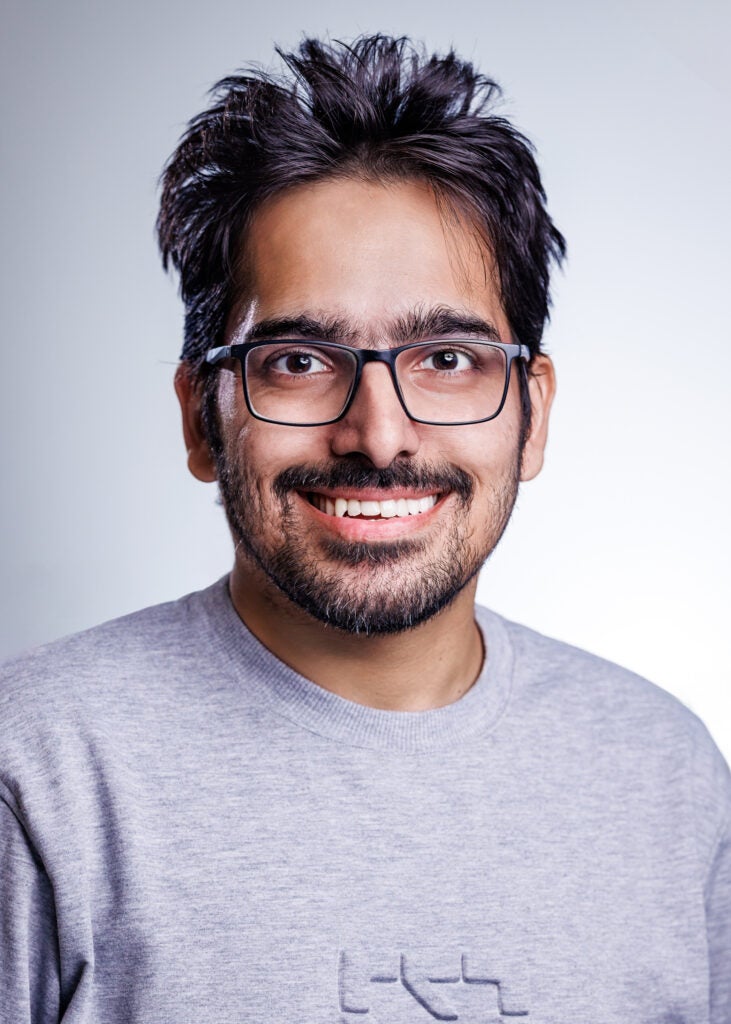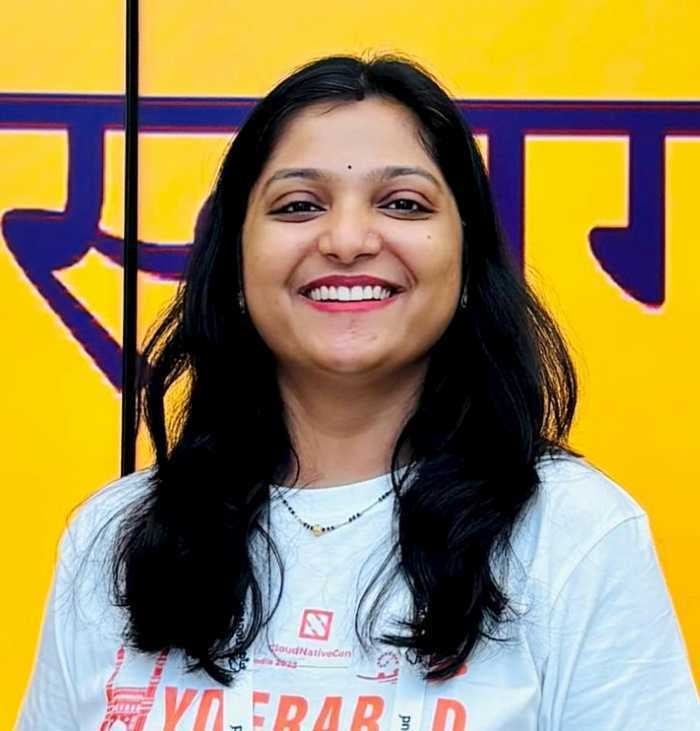Submit Your Talk
KubeCon + CloudNativeCon gathers adopters and technologists from leading open source and cloud native communities from 18-19 June. Join our current graduated, incubating, and sandbox projects as the community gathers to further the education and advancement of cloud native computing.
Submissions are due by Sunday, 1 February at 11:59pm India Standard Time (UTC+05:30)
For any questions regarding the CFP process, please email cfp@cncf.io.
Important: Please do not list yourself as a speaker or co-speaker on more than three submissions. If you are listed on more than three, all of your submissions may be removed from review, including those with co-speakers. This policy helps ensure fairness, broad representation in the program, and a manageable review workload for the program committee.
Be mindful of how many sessions you submit or agree to join as a co-speaker, as it could impact not only your own chances but also your co-speakers’.
Program Co-Chairs

Saiyam Pathak
Saiyam Pathak is the Head of Developer Relations at vCluster and the founder of Kubesimplify, a platform dedicated to making cloud-native and AI technologies accessible for all. He has previously worked with Civo, Walmart Labs, Oracle, and HP, contributing across multiple dimensions of Kubernetes — from machine learning platforms and scaling strategies to multi-cloud environments and managed Kubernetes services.
A strong advocate of open source and community learning, Saiyam actively empowers developers through blogs, workshops, and meetups. He is a CNCF TAG Operational Resilience co-chair, a Kubestronaut, and a YouTuber focused on practical Kubernetes content.
You can find him on X (Twitter): @saiyampathak

Sonali Srivastava
Sonali Srivastava is a Senior Developer Advocate at InfraCloud Technologies – an Improving Company, and an organizer of the Women in Cloud Native CNCF Community Group. She has worked across key areas of the cloud-native landscape, from authoring the Linux Foundation course Mastering Kubernetes Security with Kyverno to enabling scalable testing workflows with Testkube and driving adoption of GitOps-based quality practices.
A strong advocate for open source, Kubernetes security, policy-as-code, and cloud native technologies, Sonali regularly shares knowledge through talks, blogs, technical documentation, and community events. She has spoken at events such as KubeCon, KCD, FOSS United, and CNCF community meetups, and advocates for inclusion, mentorship, and career returners in open source.
Find her on X: @sonali_talks
Need Help choosing a Track?
While CNCF does not intend to strictly dictate which track your submission should go to, we believe it would be helpful to provide some guidelines for beginners to better understand the various submission tracks and the types of projects or ideas relevant to each. The table below has been curated by carefully exploring the CNCF Landscape and CNCF Technical Advisory Groups (TAGs) and mapping them to the suggested topics for KubeCon + CloudNativeCon.
Please note that this is intended only as a rough guideline for those who are unsure which track to choose for their submission; your ideas and imagination are not limited to these examples.
| Track | Example Landscape Categories | Example Tags |
|---|---|---|
| AI + ML | • Observability and analysis • Orchestration and management provisioning | • Workload foundations • Infrastructure |
| Application Development | • App definition and development • Observability and analysis | • Developer experience • Workload foundations |
| Cloud Native Experience | • App definition and development • Orchestration and management | • Developer experience • Operational resilience • General community |
| Cloud Native Novice | • All | • General community |
| Connectivity | • Provisioning • Orchestration and management runtime | • Infrastructure • Operational resilience |
| Data Processing + Storage | • Runtime • App definition and development | • Security and compliance • Workload foundations |
| Emerging + Advanced | • All | • All |
| Observability | • Observability and analysis • App definition and development | • Operational resilience • Security and compliance |
| Operations + Performance | • Observability and analysis • Orchestration and management runtime | • Workload foundations • Infrastructure |
| Platform Engineering | • App definition and development • Orchestration and management | • Workload foundations • Developer experience • Operational resilience |
| Security | • Provisioning • Observability and analysis | • Security and compliance • Infrastructure |
End User Companies
End user companies utilize cloud native technologies internally without offering external services. Examples include Adidas, Apple, and Spotify. Cloud native vendors, such as AWS and Red Hat, are not end users.
To determine if your company is an end user, please refer to this end user list.
If unsure, please email cfp@cncf.io for assistance.
Preparing to Submit Your Proposal
While it is not our intention to provide you with strict instructions on how to prepare your proposal, we hope you will take a moment to review the following guidelines that we have put together to help you prepare the best submission possible. To get started, here are three things that you should consider before submitting your proposal:
There are plenty of ways to give a presentation about projects and technologies without focusing on company-specific efforts. Remember the things to consider that we mentioned above when writing your proposal and think of ways to make it interesting for attendees while still letting you share your experiences, educate the community about an issue, or generate interest in a project.
Writing Your Proposal
Your session title will be the main point of reference for attendees to decide if they want to attend your talk, so choose it carefully. The title should accurately reflect the content of your talk and comply with The Linux Foundation’s Inclusive Language Initiative. Please use title case when inputting your title.
In the session description, make the most of your opportunity to pitch your talk to the program committee by emphasizing its problem, contribution, and relevance. Don’t forget technical details, but keep the big picture in mind. Your proposal’s description should be focused, detailed, and comply with The Linux Foundation’s Inclusive Language Initiative. It will appear on the website schedule if accepted, so ensure it’s error-free, uses full sentences, and written in the third person. This description can make or break an attendee’s decision to attend your talk, so provide enough information to aid their choice, and be concise. The competition for presentation slots is high, so a well-crafted, engaging abstract will improve your chances of acceptance.
Use this opportunity to elaborate on why your presentation is important and why attendees should care. Explain how your content will benefit the ecosystem or share any other relevant information with the co-chairs and program committee. We understand that this can be a challenging question to answer, but like the abstract, the relevance of your presentation is crucial, and it’s as significant as the content in determining acceptance.
Please indicate whether your submission is a case study. In other words, is your submission a report of an organization’s implementation of something, such as a practice, a product, a system, a service, or combination thereof? The case study can be thought of as a real-world test of how the implementation works, and how well it works.
If you have presented this talk before within the past year at a CNCF or Linux Foundation event, please explain the significant differences between that presentation and the one you are proposing in your session description.
Please list all CNCF-hosted graduated, incubating, or sandbox software(s) as well as all open source projects that your presentation will be focused on if applicable.
Since the Program Committee reviews numerous proposals, additional resources can assist in assessing a speaker’s proficiency and presentation skills. Please provide a video or audio recording of a previous talk you have given. If you do not have any prior recordings of your talk, you may create a brief YouTube video of yourself speaking for a few minutes.
How to Give a Great Talk
We want to make sure submitters receive resources to help put together a great submission and if accepted, give the best presentation possible. To help with this, we recommend viewing seasoned speaker Dawn Foster’s in-depth talk: Getting Over Your Imposter Syndrome to Become a Conference Speaker – Dawn Foster, VMware
Have More Questions? First Time Submitting? Don’t Feel Intimidated
CNCF events are an excellent way to get to know the community and share your ideas and the work that you are doing and we strongly encourage first-time speakers to submit talks for our events. In the instance that you aren’t sure about which track to submit under, reach out to us and we will be more than happy to provide you guidance.
How to submit
First time using Sessionize?
Sessionize is a cloud-based event content management software designed to be intuitive and user-friendly. If you need guidance, please review how to submit your session for an event to see step-by-step instructions and helpful screenshots.
Submitting on behalf of somebody else?
While speakers ordinarily submit their sessions themselves, it’s also common for them to have someone else do it in their name. Submitters can choose to submit as someone else and must fill out the necessary speaker fields, but the session submission process is otherwise identical to when the session is submitted by the speaker themselves.
sample submission
Example title
OCI, CRI, ??: Making Sense of the Container Runtime Landscape in Kubernetes
Example Description
You’ve probably heard about the OCI—a standardization effort to share a common definition for container runtime, image, and image distribution. Add to that the CRI (container runtime interface) in Kubernetes—designed to abstract the container runtime from the kubelet—and you may start to wonder what all these standards and interfaces mean for you in a Kubernetes world.
As of this year, a long list of runtimes, including CNCF projects containerd and cri-o, all implement the CRI. But did you know there are quite a few others? The unique number of CRI combinations is growing, all of which use the common OCI definitions for runtime and image interoperability.
But how would you decide which container runtime is right for you? Clearly each one has tradeoffs. This talk will help describe the current landscape and give you details on the why and how of each CRI implementation available today.
Example Benefits to the ecosystem
It is a repeating comment across the CNCF ecosystem that the number of choices for container runtime is confusing, especially for those who are newer to our ecosystem. Even for those who many have heard the names–Docker, containerd, cri-o–even they are curious as to the reasons why there are many varied runtimes available to implement the CRI interface for Kubernetes, and what is the history that brought us to this point.
This talk helps bring clarity to the container runtime landscape, and especially shows the interesting work being done in additional isolation technologies like gVisor, AWS Firecracker, and Kata containers and why that may be of value to consider for certain security or workload constraints.
In the end, especially as we have two major runtimes as CNCF projects, this talk hopefully brings a level of insight to practitioners, developers, and operators as to why clusters may choose various runtimes and how new features in Kubernetes like RuntimeClass are making it easier to support mixed clusters that can support the needs of workloads with different isolation features or requirements.
Submission Reviewer Guidelines
To help you further understand what is considered while the program committee and co-chairs are reviewing your proposal, please review the Submission Reviewer Guidelines.
Code of conduct
CNCF and its project communities are dedicated to providing a harassment-free experience for participants at our events. All submitters are required to abide by our Code of Conduct.
CFP questions
If you have any questions regarding the CFP process, please contact us at cfp@cncf.io.
